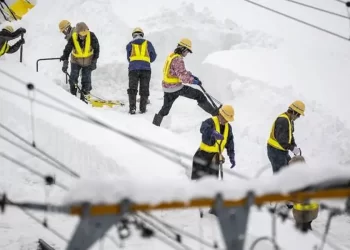PHOENIX (news agencies) — Extreme heat alerts continued for tens of millions of people in the United States on Tuesday as cities including Chicago broke records at the start of a week of sweltering weather.
States in the Midwest started to bake Monday in what the National Weather Service called a dangerous and long duration heat wave that was expected to stretch from Iowa to Maine into at least Friday.
On Monday, Chicago broke a 1957 temperature record with a high of 97 degrees Fahrenheit (36.1 degrees Celsius). Hot and muggy conditions will continue this week with peak heat indexes near 100 F (37.7 C) at times, the National Weather Service in Chicago said in a post on social platform X.
The heat didn’t stop people in Chicago’s Grant Park from ordering the hottest dishes off the menu at the food truck where Emmanuel Ramos is a cook, WBBM-TV reported.
“They be ordering the hottest stuff on the hottest day,” he said. “They order ramen, corn — they just want everything hot. I don’t know why,” said Ramos. “Right now, something that would be good is the smoothies.”
The U.S. last year saw the most heat waves, consisting of abnormally hot weather lasting more than two days, since 1936. Officials warned residents to take precautions.
Much of the Midwest and Northeast were under heat warnings or watches with officials announcing the opening of cooling centers and urging people to limit outdoor activities when possible and to check in with family members and neighbors who may be vulnerable to the heat.
The heat has been especially dangerous in recent years in Phoenix, where 645 people died from heat-related causes in 2023, which was a record. Temperatures there hit 112 F (44.4 C) on Saturday. Weather service forecasters say the first two weeks of June in Phoenix were the hottest start to the month on record there.
A meteorologist with the National Weather Service in Phoenix, Ted Whittock, advised reducing time outdoors between 10 a.m. and 6 p.m., staying hydrated and wearing light, looser fitting clothing. More than 100 cooling centers were open in the city and surrounding county, including two new overnight ones.
In Southern California, firefighters increased their containment of a large wildfire in mountains north of Los Angeles on Monday after a weekend of explosive, wind-driven growth along Interstate 5.
The warming temperatures come amid growing concern about the effects of extreme heat and wildfire smoke. The nonprofit Center for Biological Diversity on Monday sent a petition to the Federal Emergency Management Agency asking it to recognize extreme heat and wildfire smoke as major disasters.
The agency did not immediately issue a specific response to the petition. A FEMA spokesperson for the western U.S. states said there was nothing that would preclude an emergency declaration for extreme heat, but noted that there would need to be an immediate threat to life and safety that local authorities could not respond to.
While much of the U.S. swelters, late-season snow was forecast for the northern Rockies on Monday into Tuesday. Parts of Montana and north-central Idaho were under a winter storm warning. As much as 20 inches (51 centimeters) was predicted for higher elevations around Glacier National Park.
Meanwhile, a fresh batch of tropical moisture was bringing an increasing threat of heavy rain and flash flooding to the central Gulf Coast.
Hurricane season this year is forecast to be among the most active in recent memory.
Follow news agencies’s coverage of weather at









